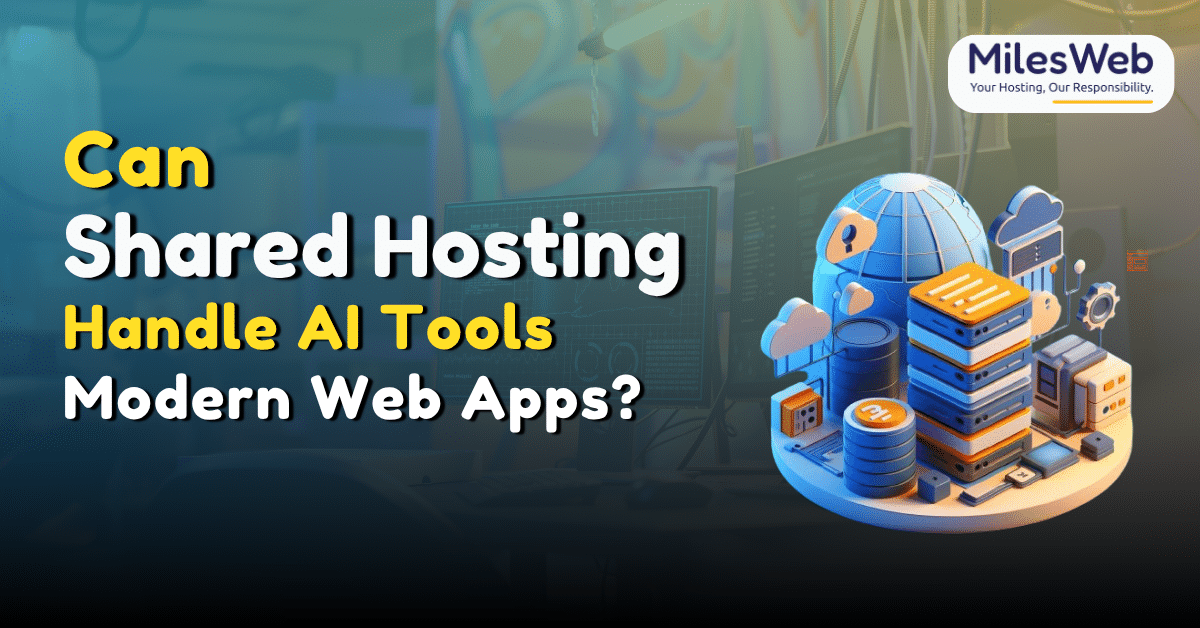Can Shared Hosting Handle AI Tools and Modern Web Apps?
The evolution of NVMe web hosting technology has occurred over a short period. New small sites offer various sophisticated AI capabilities, APIs, and real-time data exchange. New web applications provide chatbots, personalized dashboards, interactive applications, and real-time data analytics. These applications are markedly more interactive and engaging than sites of just a few years ago. This situation raises questions from many developers and startups about whether shared hosting can effectively handle such extensive workloads.
In most cases, shared web hosting cost is the most popular hosting option for beginners, small businesses, and individuals launching their first projects, due to its affordability and low maintenance and technical oversight requirements.
The moment one starts using AI integration tools, machine learning scripts, or other data-driven functionalities, the shortcomings of shared hosting become clear. These days, modern shared hosting can surprisingly accommodate a fair amount of intelligent web functionalities due to the advancements in data center server management, caching, dynamic allocation of compute resources, and the routine handling of workloads.
An Overview of Shared Hosting
In shared hosting, several websites are run off the same server. The CPU, RAM, and server disk space are shared among the websites. This makes it possible for hosting providers to offer very low prices, as clients only pay for a small percentage of the server’s overall resources. Shared hosting is useful for very simple websites, including small online stores, blogs, and portfolio websites.
Websites that incorporate advanced data analytics features, such as predictive analytics or natural language tools, image recognition, and other AI-driven tools, consume a lot more resources. A shared hosting server can struggle to meet the demands of several concurrent data queries and the extensive calculations that predictive analytics entail. Since the installation of resource management and optimization techniques of modern hosting companies, the issues mentioned above have been less common.
How AI Works in Shared Hosting
There have been significant upgrades to shared hosting infrastructure in recent years. The new technologies for resource optimization, including LiteSpeed caching, CloudLinux, and PHP isolation, have become standard. Each site hosted on a server is guaranteed a minimum level of processing power to ensure that none is affected by the demands of others in a resource-hungry environment.
Technologies that use AI, including chatbots and content automation tools, do not require sophisticated deep learning tools or advanced GPUs. These tools work on your site through APIs. In these instances, all you need is shared hosting because your server provider is performing all of the heavy lifting.
Consider the case of shared hosting connected to OpenAI or Google Cloud. Your shared hosting resources will manage their data requests. Cloud resources will do the heavy lifting. Properly optimized shared hosting will work fine for low-tier AI and intelligent web connection functionalities.
Shared hosting will be a practical and inexpensive option. Then, of course, there will be another side, and as such, we need to state the downsides. In the case of real-time video processing, intricate local AI work, or training ML models, shared hosting will not be an appropriate solution. You would need a dedicated server, a VPS, or GPU cloud hosting.
Since, for example, automation tools, voice assistants, content personalization plugins, embedded chatbots, and pre-trained AI models all still work on shared hosting, this will still be a practical and inexpensive option.
Integrated Collaboration Tools and Email
Ideally, startups that depend on AI and other communication tools must have regular contact, and communication through emails is key; most hosting companies provide email services free for the first year, only to charge annual fees thereafter.
MilesWeb, on the other hand, provides free email accounts for life, which means that startups and developers can create as many business emails as they like without worrying about renewal fees. This is helpful for intra-team communication and for professional communication regarding your AI or web development project.
Ability to Scale
Scalability is yet another modern-day shared hosting benefit. This is because most hosting companies enable one-click upgrades to VPS or cloud hosting as your site expands. In this scenario, you can sign up for cheap shared plans, practice your AI tools, and move up to higher plans with ease as your traffic or resource needs expand.
Adaptability offered on cloud-powered shared hosting environments is modern. Features like load balancing, SSD storage, optimized PHP versions, and other cloud-powered features ensure support for modern frameworks like Laravel, Django, and Node.js (within limited capacities).
Conclusion: Shared Hosting: The New Frontier for AI
Shared hosting services can now do more than just host basic websites. With the addition of caching mechanisms, resource management systems, and APIs, lightweight AI tools and modern interactive web apps can now be incorporated into shared hosting.
The most economical form of hosting continues to make possible innovations for enterprises and developers. Automated backup functions, recurring backup systems, free lifetime email accounts with hosting, and hosting setups that accommodate modern web applications further enhance this.

